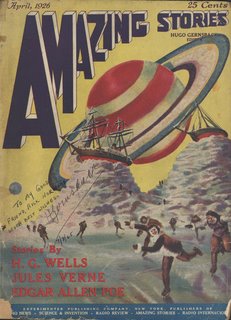
Any claim about the origin or definition of science fiction is inevitably controversial - questions about the boundaries of the genre, and the first appearance of something that was distinctively sf, are endlessly debated by writers, critics and fans. Did science fiction begin early in the 19th century, with the publication of Mary Shelley's Frankenstein? Or perhaps in the 1890s, with the appearance of H.G. Wells's first great scientific romances? But what about the earlier work of Edgar Allan Poe and Jules Verne? Perhaps the genre can be traced back to earlier times, when precursor works appeared - but how much like the real thing does a precursor have to be if it is to count?
My favourite date is 1895, but a good argument can also be made for 1926, in which case science fiction has just turned 80. On this account, the work of Verne, Wells, etc., was retrospectively included in a genre that really crystallised as a social phenomenon with the publication of the first specialised magazines, notably Hugo Gernsback's Amazing Stories. That theory may be as good as any. It is certainly worth noting that the modern sf genre has a social history that is continuous in many ways with the professional work that first appeared under the editorship of Gernsback and later John W. Campbell. What earlier fiction was seen as belonging to the genre was largely defined by those great early editors.
Of course, I actually take the view that there's no simple fact of the matter of when science fiction started - we have various facts about when works of certain kinds began to appear, what social and professional connections existed, and so on. There is no further fact as to which of these events was "really" the beginning - that's more a question of semantics and personal emphases, and of what historical perspectives are illuminating in different contexts. But there's no doubt that 1926 was an important year in the science fiction genre's history, so let's take note and pour a glass in celebration.

No comments:
Post a Comment